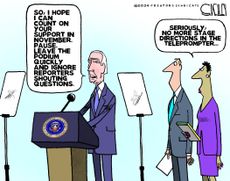Butler-Sloss and Patten? Are there no better candidates?
Establishment should look beyond its circle and appoint more credible and younger people to these roles

There is a grievous tradition in Britain (and apparently in the Vatican) never to think outside the box when it comes to appointing a committee chairman. Need an inquiry? Send for a tried and trusted member of the establishment. The press is up to no good? Call a senior judge. A scientist is driven to suicide after “leaking” accurate information? Reach for another judge.
Never, but never, think outside the box. Who knows what a loose cannon might get up to? In the eyes of the powers-that-be, committees are set up to soothe troubled brows, not dig the dirt.
The issue is never far away, but is raised this week by two appointments drawn from the usual list of insider suspects. The first is the choice of Lady Butler-Sloss, 80, to chair a panel that will examine the handling of child abuse allegations by public institutions: the second is the selection by Pope Francis of our very own Lord (Chris) Patten, 70, to head a committee to advise the Pope on media strategy.
Subscribe to The Week
Escape your echo chamber. Get the facts behind the news, plus analysis from multiple perspectives.

Sign up for The Week's Free Newsletters
From our morning news briefing to a weekly Good News Newsletter, get the best of The Week delivered directly to your inbox.
From our morning news briefing to a weekly Good News Newsletter, get the best of The Week delivered directly to your inbox.
What the Vatican does is its business. But choosing Patten, the Pooh-Bah of the British establishment since the voters of Bath booted him out of the Commons in the 1992 general election, is close to a joke. Who in their right mind in this age of social media calls a 70-year-old to switch on a computer, never mind devise a digital strategy to help the Pope improve contact with his worldwide flock?
Pooh-Bah, readers may remember, was WS Gilbert’s inspired creation in The Mikado of a man who held every position of importance in the land… ‘First Lord of the Treasury, Lord Chief Justice, Commander-in-Chief, Lord High Admiral... Archbishop of Titipu, and Lord Mayor…’ The career of Chris Patten – former governor of Hong Kong, former European commissioner, Chancellor of Oxford University, former chairman of the BBC Trust, former chairman of the commission that abolished the Royal Ulster Constabulary – out-satirises Gilbert.
Patten left the BBC Trust just two months ago to have heart surgery and to take things more easily. His time at the Beeb was widely considered a sad anti-climax to his previously unsullied post-parliamentary career: the corporation’s executive pay shot through the roof; his selected DG lasted 54 days; a peer was falsely (though anonymously) implicated by the BBC in a child abuse scandal; and Newsnight sat on a programme that would have exposed Jimmy Savile’s evil ways.
However, as far as British public life is concerned, the choice of Lady Butler-Sloss is of far greater importance. It must be stressed that she is a person of the utmost integrity with a track record of performance and duty second to none. But she was the sister of Lord Havers (best known as the father of actor Nigel Havers) who was attorney-general under Mrs Thatcher in the 1980s. This was when some of the possible ‘cover-ups’ within institutions into which Lady B-S is to inquire may have happened.
There are suggestions that Havers, who died in 1992, adopted an establishment line and supported the DPP’s decision not to prosecute Sir Peter Hayman, a diplomat and member of the Paedophile Information Exchange (PIE); also, that he tried to prevent the Tory MP, Geoffrey Dickens, raising claims about Hayman in the House of Commons.
The fact that Havers was at the heart of law enforcement while at least some of the events which his sister must now investigate allegedly occurred should surely preclude her from accepting the Home Office invitation. As one lawyer put it: appointing Butler-Sloss to head this inquiry is akin to selecting a relation of the chief constable of South Yorkshire, however eminent and fair-minded, to chair the Hillsborough inquiry.
Lady Butler-Sloss is now 80, and, while clearly vigorous, can scarcely still be at the peak of her energy. There must somewhere in this land be someone less linked to the establishment, just as admired for their forensic skills, just as untainted by past compromise or scandal, whom the government could have chosen – and who just might be a tad younger than her ladyship.
Which brings us back to the start. In almost every walk of British life those who do the appointing only look to those already in the establishment frame. Need a new editor? Choose one who has recently come on the market. Want a new manager for a football club? Ditto. Some of this is harmless, but not in relation to vital national issues such as the institutional responses to child abuse. In recent years many bodies have been more concerned with self-protection than with uprooting wrong-doing.
Honours and gongs, therefore, are the order of the day for the in-crowd. As the rich get richer and the poor poorer, what does it matter if more credible (and younger) candidates to investigate and unearth corruption and wrong-doing remain outside the magic circle of the great and the good? This systematic selection of insiders does as much as anything – alongside allied scandals like MPs’ expenses – to undermine what was once the unblinking trust of the mass of British people in those who rule over us.
Somewhere there must be a landfill site of ‘lost’ documents – ‘mislaid’ from departments of government, from police forces, from hospitals, from anywhere where awkward questions have been asked. Britain needs inquiries that hunt down and name the people who bury the evidence – and needs new blood to chair those inquiries.
Create an account with the same email registered to your subscription to unlock access.
Sign up for Today's Best Articles in your inbox
A free daily email with the biggest news stories of the day – and the best features from TheWeek.com
-
 'Horror stories of women having to carry nonviable fetuses'
'Horror stories of women having to carry nonviable fetuses'Instant Opinion Opinion, comment and editorials of the day
By Harold Maass, The Week US Published
-
 Haiti interim council, prime minister sworn in
Haiti interim council, prime minister sworn inSpeed Read Prime Minister Ariel Henry resigns amid surging gang violence
By Peter Weber, The Week US Published
-
 Today's political cartoons - April 26, 2024
Today's political cartoons - April 26, 2024Cartoons Friday's cartoons - teleprompter troubles, presidential immunity, and more
By The Week US Published